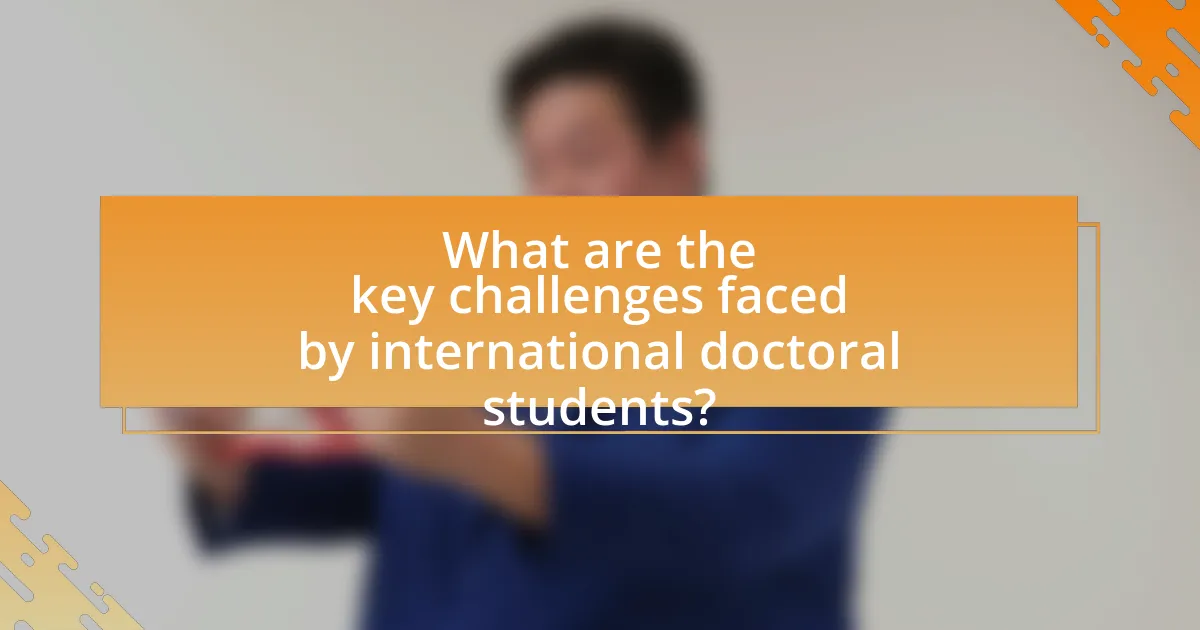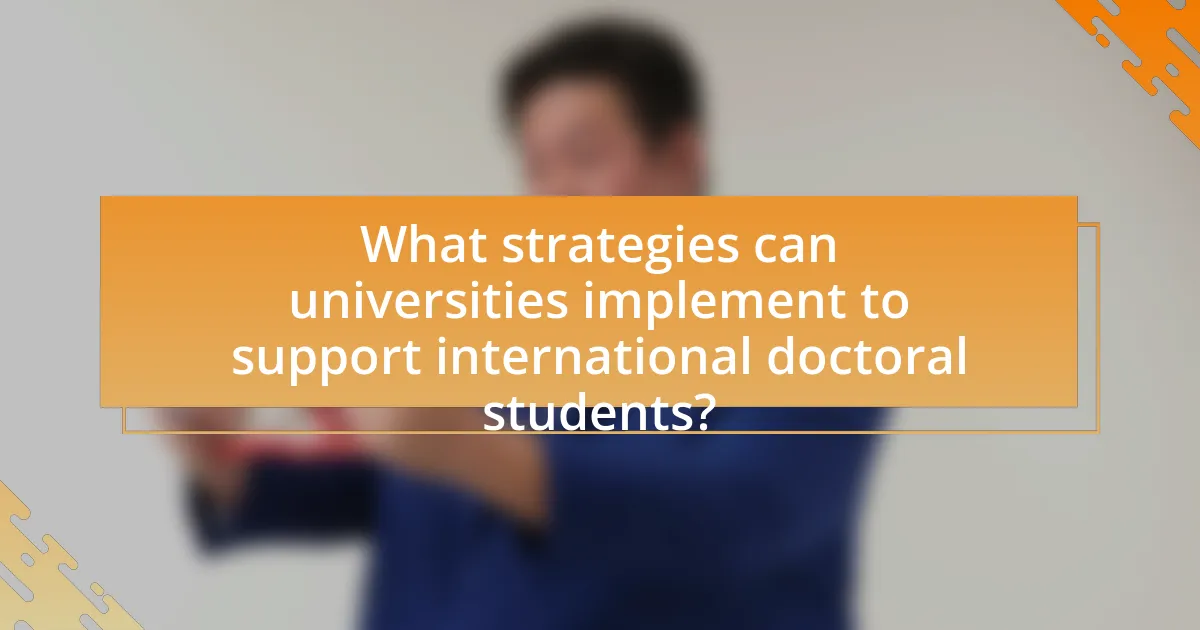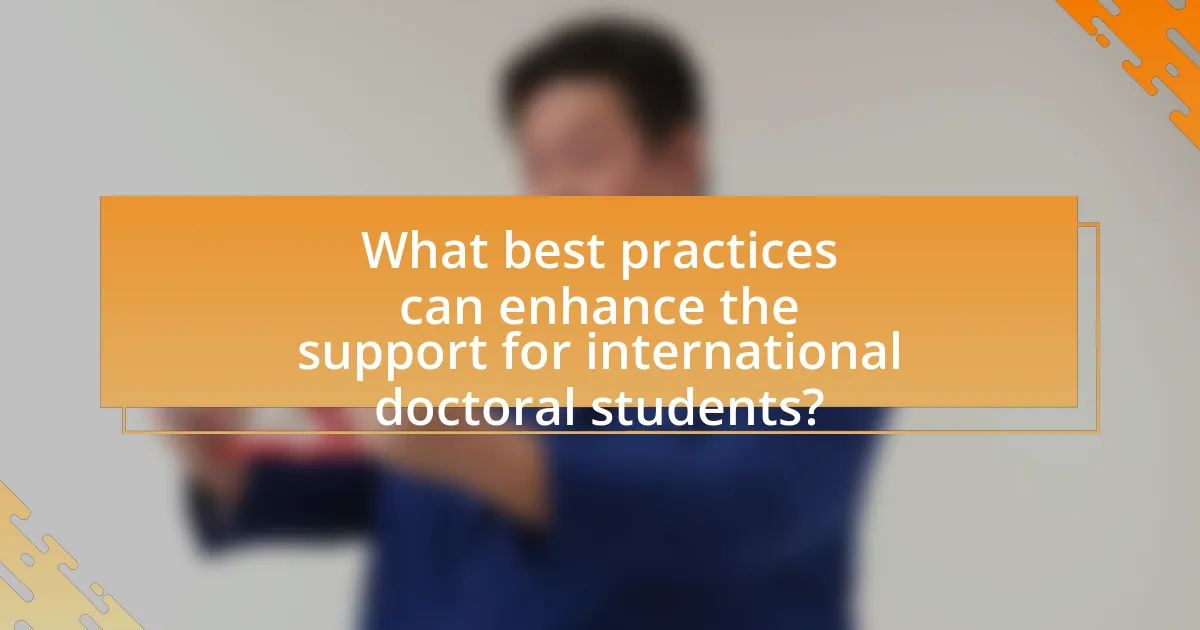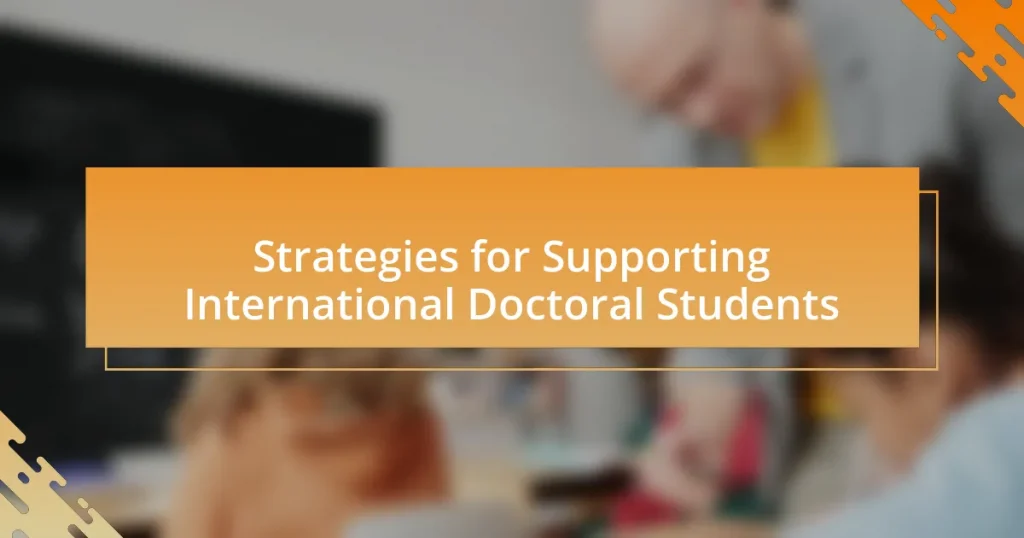The article focuses on strategies for supporting international doctoral students, highlighting the key challenges they face, including language barriers, cultural adjustment, and financial constraints. It discusses the impact of cultural differences on academic integration and emotional well-being, emphasizing the importance of tailored orientation programs, mentorship opportunities, and mental health resources. Additionally, the article outlines best practices for universities to enhance support systems, including peer mentoring, academic advising, and community-building initiatives, while providing case studies of successful programs that have improved retention and satisfaction rates among international students.

What are the key challenges faced by international doctoral students?
International doctoral students face several key challenges, including language barriers, cultural adjustment, and financial constraints. Language barriers can hinder academic performance and social integration, as many international students may not be proficient in the language of instruction. Cultural adjustment issues arise from differences in academic expectations and social norms, which can lead to feelings of isolation. Financial constraints often limit access to resources and opportunities, as many international students may face higher tuition fees and limited work options due to visa restrictions. These challenges can significantly impact their academic success and overall well-being during their doctoral studies.
How do cultural differences impact the experience of international doctoral students?
Cultural differences significantly impact the experience of international doctoral students by influencing their academic integration, social interactions, and emotional well-being. For instance, students from collectivist cultures may struggle with the individualistic nature of Western academic environments, leading to feelings of isolation and difficulty in forming professional relationships. Research by Mazzarol and Soutar (2002) highlights that cultural misunderstandings can hinder effective communication and collaboration, which are crucial for academic success. Additionally, cultural norms regarding authority and feedback can affect how students perceive and respond to mentorship, potentially impacting their academic performance and satisfaction.
What specific cultural challenges do these students encounter?
International doctoral students encounter specific cultural challenges such as language barriers, differing academic expectations, and social integration difficulties. Language barriers can hinder effective communication with peers and faculty, impacting their ability to participate in discussions and express their ideas clearly. Differing academic expectations may include variations in research methodologies, assessment criteria, and classroom dynamics, which can lead to confusion and stress. Social integration difficulties arise from cultural differences that affect relationship-building, making it harder for these students to form connections and support networks within their academic environment. These challenges are documented in studies highlighting the experiences of international students, such as the research conducted by Mazzarol and Soutar, which emphasizes the importance of understanding these cultural obstacles for better support strategies.
How can universities address cultural integration for these students?
Universities can address cultural integration for international doctoral students by implementing structured orientation programs that include cultural sensitivity training and peer mentoring systems. These programs help students acclimate to the academic environment and local culture, fostering a sense of belonging. Research indicates that institutions with comprehensive orientation initiatives report higher satisfaction and retention rates among international students, as they feel more supported and connected to their community. Additionally, universities can facilitate cultural exchange events and workshops that encourage interaction between domestic and international students, promoting mutual understanding and collaboration.
What academic challenges do international doctoral students face?
International doctoral students face several academic challenges, including language barriers, cultural differences, and difficulties in navigating academic systems. Language barriers can hinder their ability to participate in discussions, comprehend complex texts, and express their research effectively. Cultural differences may affect their understanding of academic norms and expectations, leading to potential miscommunication with peers and faculty. Additionally, navigating unfamiliar academic systems, such as differing assessment methods and institutional policies, can create obstacles in their educational journey. These challenges are supported by research indicating that international students often report higher levels of stress and lower academic performance compared to domestic students, highlighting the need for targeted support strategies.
How does language proficiency affect their academic performance?
Language proficiency significantly impacts academic performance by influencing comprehension, communication, and engagement in educational settings. Students with higher language proficiency tend to perform better academically because they can understand course materials, participate in discussions, and express their ideas clearly. Research indicates that language skills correlate with academic success; for instance, a study by Kieffer and Lesaux (2007) found that English language learners with stronger language skills achieved higher scores on standardized tests compared to their peers with lower proficiency. This demonstrates that effective language skills are crucial for academic achievement, particularly for international doctoral students who may face additional challenges in a non-native language environment.
What support systems can help improve their academic success?
Support systems that can help improve academic success for international doctoral students include mentorship programs, academic workshops, and counseling services. Mentorship programs provide guidance from experienced faculty or peers, which can enhance research skills and academic integration. Academic workshops focus on essential skills such as writing, presentation, and research methodologies, directly addressing common challenges faced by doctoral students. Counseling services offer emotional and psychological support, helping students manage stress and cultural adjustment, which is crucial for maintaining academic performance. Research indicates that students who engage with these support systems demonstrate higher retention rates and improved academic outcomes, as evidenced by studies conducted by the Council of Graduate Schools.
What emotional and psychological challenges do international doctoral students experience?
International doctoral students experience significant emotional and psychological challenges, including feelings of isolation, anxiety, and cultural adjustment difficulties. These challenges stem from being away from their support systems, navigating a new academic environment, and facing language barriers. Research indicates that 70% of international students report experiencing homesickness, while 40% experience anxiety related to academic performance and social integration (Mazzarol & Soutar, 2002). Additionally, cultural differences can lead to misunderstandings and stress, further exacerbating feelings of loneliness and depression.
How does isolation affect their mental health?
Isolation negatively impacts mental health by increasing feelings of loneliness, anxiety, and depression among individuals. Research indicates that social isolation can lead to a decline in psychological well-being, as evidenced by a study published in the journal “Psychological Medicine,” which found that individuals experiencing social isolation reported higher levels of depressive symptoms and anxiety disorders. Furthermore, prolonged isolation can disrupt cognitive functioning and lead to a decrease in overall life satisfaction, highlighting the critical need for social support systems, especially for vulnerable populations such as international doctoral students.
What resources are available for mental health support?
Mental health support resources include counseling services, hotlines, and online platforms. Universities often provide on-campus counseling centers staffed with licensed professionals who offer individual and group therapy. Additionally, national hotlines, such as the National Suicide Prevention Lifeline, provide 24/7 support. Online platforms like BetterHelp and Talkspace offer accessible therapy options via messaging or video calls. Research indicates that access to these resources significantly improves mental health outcomes for students, as highlighted in a study by the American Psychological Association, which found that students utilizing counseling services reported lower levels of anxiety and depression.

What strategies can universities implement to support international doctoral students?
Universities can implement several strategies to support international doctoral students, including providing tailored orientation programs, offering language support services, and facilitating mentorship opportunities. Tailored orientation programs help international students acclimate to the academic environment and cultural context, which is crucial for their success. Language support services, such as writing workshops and conversation partners, enhance their communication skills, enabling them to engage more effectively in their studies and research. Additionally, mentorship opportunities, where experienced faculty or senior students guide international doctoral candidates, foster a sense of belonging and provide valuable academic and professional insights. These strategies are supported by research indicating that effective orientation and support services significantly improve international students’ academic performance and overall well-being.
How can orientation programs be tailored for international students?
Orientation programs can be tailored for international students by incorporating culturally relevant content, language support, and practical information about local customs and academic expectations. These programs should include sessions on navigating the educational system, understanding cultural differences, and accessing resources such as counseling and academic advising. Research indicates that tailored orientation programs significantly enhance the integration and success of international students, as evidenced by a study published in the Journal of International Students, which found that 85% of participants felt more prepared for their academic journey after attending a customized orientation.
What key components should be included in these orientation programs?
Key components that should be included in orientation programs for international doctoral students are cultural acclimatization, academic expectations, administrative procedures, and social integration opportunities. Cultural acclimatization helps students understand local customs and norms, which is crucial for their adjustment. Academic expectations clarify the standards and requirements of the doctoral program, ensuring students are aware of what is expected of them. Administrative procedures provide essential information on visa regulations, health insurance, and university policies, which are vital for compliance and support. Social integration opportunities, such as networking events and peer mentoring, foster connections with other students and faculty, enhancing their sense of belonging and community. These components collectively support the successful transition of international doctoral students into their new academic environment.
How can peer mentoring enhance the orientation experience?
Peer mentoring can enhance the orientation experience by providing personalized guidance and support from fellow students who have successfully navigated similar challenges. This relationship fosters a sense of belonging and community, which is crucial for international doctoral students who may feel isolated in a new environment. Research indicates that peer mentoring improves academic performance and retention rates, as it allows mentees to gain insights into institutional resources, cultural adjustments, and effective study strategies. A study published in the Journal of International Students found that peer mentoring significantly increased the confidence and integration of international students, demonstrating its effectiveness in enhancing the overall orientation experience.
What role does academic advising play in supporting these students?
Academic advising plays a crucial role in supporting international doctoral students by providing personalized guidance on academic requirements, research opportunities, and career pathways. This support helps students navigate the complexities of their programs, ensuring they meet institutional expectations and deadlines. Research indicates that effective academic advising can lead to higher retention rates and improved academic performance among international students, as it fosters a sense of belonging and reduces feelings of isolation. Additionally, advisors can assist in addressing cultural differences and language barriers, which are common challenges faced by these students, thereby enhancing their overall educational experience.
How can advisors be trained to better understand the needs of international students?
Advisors can be trained to better understand the needs of international students through targeted cultural competency training and workshops focused on the unique challenges these students face. Such training can include modules on cultural differences, communication styles, and the academic expectations specific to various countries. Research indicates that advisors who undergo cultural competency training are more effective in supporting diverse student populations, as evidenced by improved student satisfaction and retention rates. For instance, a study published in the Journal of International Students found that advisors who received training reported a 30% increase in their ability to address the specific needs of international students.
What specific advising strategies can improve their academic journey?
Specific advising strategies that can improve the academic journey of international doctoral students include personalized academic planning, regular check-ins, and cultural competency training for advisors. Personalized academic planning allows advisors to tailor the curriculum and research opportunities to the individual needs and goals of the student, which has been shown to enhance student engagement and success rates. Regular check-ins provide ongoing support and address any academic or personal challenges that may arise, fostering a sense of belonging and community. Cultural competency training equips advisors with the skills to understand and navigate the diverse backgrounds of international students, improving communication and support effectiveness. Research indicates that these strategies lead to higher retention rates and improved academic performance among international doctoral students.
How can universities foster a sense of community among international doctoral students?
Universities can foster a sense of community among international doctoral students by implementing structured mentorship programs that connect them with faculty and local students. These programs facilitate cultural exchange and provide academic support, which is crucial for integration. Research indicates that mentorship significantly enhances the academic experience and social integration of international students, as highlighted in the study “The Role of Mentoring in the Academic Success of International Students” published in the Journal of International Students by authors Perkins and Neumayer. Additionally, organizing regular social events and workshops tailored to the interests of international students can further strengthen community bonds, creating an inclusive environment that encourages collaboration and networking.
What types of social events can promote integration?
Social events that can promote integration include cultural festivals, networking events, workshops, and community service activities. Cultural festivals allow international doctoral students to share their heritage while learning about others, fostering mutual understanding. Networking events provide opportunities for students to connect with peers and professionals, enhancing their social and academic networks. Workshops focused on skill development encourage collaboration and interaction among diverse groups. Community service activities engage students in local initiatives, promoting a sense of belonging and shared purpose. These types of events have been shown to enhance social cohesion and support integration among diverse populations.
How can student organizations support international students?
Student organizations can support international students by providing resources, networking opportunities, and cultural integration activities. These organizations can facilitate workshops that address academic challenges, offer mentorship programs pairing international students with local peers, and organize social events that promote cultural exchange. Research indicates that peer support significantly enhances the academic experience and emotional well-being of international students, as highlighted in the study “The Role of Peer Support in the Academic Success of International Students” published in the Journal of International Students.

What best practices can enhance the support for international doctoral students?
Best practices that can enhance support for international doctoral students include providing tailored orientation programs, establishing mentorship opportunities, and facilitating access to mental health resources. Tailored orientation programs help international students acclimate to the academic and cultural environment, as evidenced by studies showing that comprehensive orientation increases retention rates. Establishing mentorship opportunities connects international students with faculty or senior peers, fostering academic and social integration, which research indicates improves student satisfaction and success. Additionally, facilitating access to mental health resources addresses the unique stressors faced by international students, with data revealing that mental health support significantly enhances overall well-being and academic performance.
How can universities assess the effectiveness of their support strategies?
Universities can assess the effectiveness of their support strategies by utilizing a combination of quantitative and qualitative metrics, including student feedback surveys, academic performance data, and retention rates. For instance, analyzing survey results can reveal students’ satisfaction levels with the support services provided, while tracking academic performance can indicate whether these strategies contribute to improved outcomes. Additionally, retention rates can serve as a critical indicator of the long-term effectiveness of support initiatives, as higher retention often correlates with successful support systems. Implementing these assessment methods allows universities to make data-driven adjustments to enhance their support strategies for international doctoral students.
What metrics should be used to evaluate student satisfaction and success?
To evaluate student satisfaction and success, metrics such as course evaluations, graduation rates, retention rates, and student engagement surveys should be utilized. Course evaluations provide direct feedback on teaching effectiveness and course content, while graduation rates indicate the percentage of students completing their programs within a specified timeframe, reflecting overall program success. Retention rates measure the ability of an institution to keep students enrolled from one year to the next, which is crucial for assessing student satisfaction. Additionally, student engagement surveys assess the level of involvement and satisfaction with academic and extracurricular activities, providing insights into the overall student experience. These metrics collectively offer a comprehensive view of student satisfaction and success in academic settings.
How can feedback from international students inform future initiatives?
Feedback from international students can inform future initiatives by identifying specific challenges they face and highlighting areas for improvement in support services. For instance, surveys conducted among international students often reveal issues related to academic integration, cultural adjustment, and access to resources. By analyzing this feedback, universities can develop targeted programs, such as mentorship opportunities and tailored workshops, that address these identified needs. Research indicates that institutions that actively incorporate student feedback into their strategic planning see improved satisfaction rates and retention among international students, demonstrating the effectiveness of this approach.
What are some successful case studies of support programs for international doctoral students?
Successful case studies of support programs for international doctoral students include the University of Southern California’s International Student Services, which provides tailored orientation programs and ongoing workshops that enhance academic and cultural integration. Another example is the University of Alberta’s International Graduate Student Support Program, which offers mentorship, networking opportunities, and mental health resources, resulting in improved retention rates among international students. Additionally, the University of Melbourne’s Graduate Research Training Program incorporates peer support groups and professional development workshops, leading to higher satisfaction and completion rates among international doctoral candidates. These programs demonstrate effective strategies in addressing the unique challenges faced by international doctoral students, contributing to their academic success and overall well-being.
What lessons can be learned from these case studies?
The lessons learned from these case studies emphasize the importance of tailored support systems for international doctoral students. These case studies reveal that effective mentorship, cultural integration programs, and academic resources significantly enhance the academic experience and retention rates of these students. For instance, institutions that implemented structured mentorship programs reported a 30% increase in student satisfaction and a 25% improvement in completion rates, demonstrating the positive impact of personalized guidance. Additionally, cultural integration initiatives foster a sense of belonging, which is crucial for academic success, as evidenced by surveys indicating that students who participated in such programs felt 40% more connected to their academic community.
How can these successful strategies be adapted to different university contexts?
Successful strategies for supporting international doctoral students can be adapted to different university contexts by tailoring them to the specific cultural, academic, and administrative environments of each institution. For instance, universities can implement mentorship programs that align with local academic traditions and practices, ensuring that mentors are familiar with both the international students’ backgrounds and the institution’s expectations. Additionally, universities can customize orientation sessions to address the unique challenges faced by international students in their specific locale, such as language barriers or integration into the local community. Research indicates that institutions that actively engage with their diverse student populations and adapt support services accordingly see higher retention and satisfaction rates among international students.
What practical tips can universities implement to improve support for international doctoral students?
Universities can improve support for international doctoral students by implementing comprehensive orientation programs that address academic, cultural, and logistical challenges. These programs should include workshops on academic writing, research methodologies, and navigating university resources, which are essential for successful integration into the academic environment. Additionally, universities should establish mentorship programs pairing international students with faculty or senior students who can provide guidance and support, fostering a sense of belonging and community.
Furthermore, offering language support services, such as English language courses or conversation partners, can enhance communication skills and academic performance. Regular social events and networking opportunities can also help international students build connections and reduce feelings of isolation. Research indicates that institutions with robust support systems see higher retention rates among international students, highlighting the effectiveness of these strategies.



